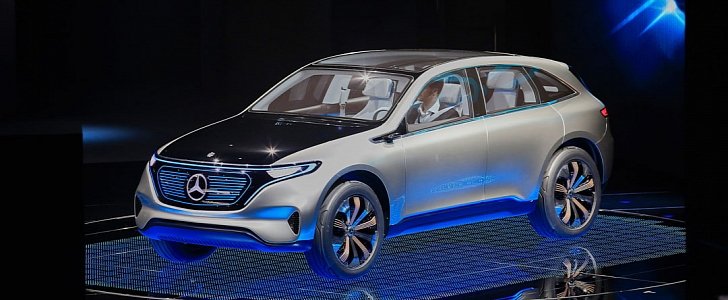Almost all major car manufacturer has at least one electric model scheduled by 2020, with some planning as many as 30 by 2025. That means there is either going to be someone willing to buy all these EVs, or a lot of the companies we now know will cease to exist.
You can rest assured, the car industry is on top of the situation and will not go bankrupt that easily. These are not some dudes who try to read the market based on what they read on the Internet the day before. Every important decision is carefully weighed and turned inside out before choosing to go one way or another.
Up to this point, none of the traditional manufacturers seemed determined to go down the path of electrification. They all said they would, but when it came to putting the money where their mouths were, nothing tangible really happened. That meant the only one left holding the EV flag was Tesla, with a little help from Nissan/Renault and, briefly, BMW.
Now, though, things are about to change. Mercedes-Benz has announced its intention to join the market by launching its EV dedicated brand called EQ, while Volkswagen has made some promises it will find very hard to back out from. And it's not just the core brand: both Audi and Porsche are pretty far ahead in their plans to produce and sell at least one EV.
Recent research conducted by McKinsey & Co. and Bloomberg New Energy Finance shows the car companies might be right. The report suggests that the EV to ICE ratio in major wealthy cities could be of almost two-thirds to one for the battery-powered cars by 2030.
The reason behind that is simple: faced with surging pollution levels, authorities are already beginning to clamp down on fuel-burning cars, especially diesels, which might get banned from city centers altogether. EVs, on the other hand, enjoy all kind of incentives such as congestion charge exemption, free parking and other advantages that make a driver's life in the city a lot more bearable.
These generically named "wealthy cities" are also the place where it's more likely to find the early adopters, and once a critical mass would be reached, EVs stand every chance of becoming mainstream. So if owning an EV makes you a hipster now, you might want to hang on to that ICE car because you'll need it in 2030 to maintain that status.
Up to this point, none of the traditional manufacturers seemed determined to go down the path of electrification. They all said they would, but when it came to putting the money where their mouths were, nothing tangible really happened. That meant the only one left holding the EV flag was Tesla, with a little help from Nissan/Renault and, briefly, BMW.
Now, though, things are about to change. Mercedes-Benz has announced its intention to join the market by launching its EV dedicated brand called EQ, while Volkswagen has made some promises it will find very hard to back out from. And it's not just the core brand: both Audi and Porsche are pretty far ahead in their plans to produce and sell at least one EV.
Recent research conducted by McKinsey & Co. and Bloomberg New Energy Finance shows the car companies might be right. The report suggests that the EV to ICE ratio in major wealthy cities could be of almost two-thirds to one for the battery-powered cars by 2030.
The reason behind that is simple: faced with surging pollution levels, authorities are already beginning to clamp down on fuel-burning cars, especially diesels, which might get banned from city centers altogether. EVs, on the other hand, enjoy all kind of incentives such as congestion charge exemption, free parking and other advantages that make a driver's life in the city a lot more bearable.
These generically named "wealthy cities" are also the place where it's more likely to find the early adopters, and once a critical mass would be reached, EVs stand every chance of becoming mainstream. So if owning an EV makes you a hipster now, you might want to hang on to that ICE car because you'll need it in 2030 to maintain that status.
























